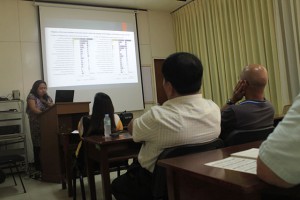To emphasize the value of access to financial services in the agriculture sector, PhilRice Los Baños conducted a seminar titled Financial Inclusion: Prospects for Agriculture and Rural Development, 24 June.
Asst. Prof. Maria Kristina G. Alinsunurin of the UPLB College of Public Affairs and Development delivered the lecture attended by over 40 Research and Development staff of PhilRice LB.
Financial inclusion refers to availability and affordability of basic financial services. In the Philippines, NCR, CALABARZON and Central Luzon are among the top regions with access to financial services such as banks, insurance companies, and credit institutions.
 Noting that agriculture remains a major economic activity in the provinces, Alinsunurin highlighted the need for rural households especially farmers to be financially included. According to her, this will make better opportunities to finance their rice farming activities and improve their agricultural productivity.
Noting that agriculture remains a major economic activity in the provinces, Alinsunurin highlighted the need for rural households especially farmers to be financially included. According to her, this will make better opportunities to finance their rice farming activities and improve their agricultural productivity.
While citing microfinance as a successful venture in the country, the speaker said that there remains a great extent of financial exclusion especially in highly rural and agricultural parts of the country like Eastern Visayas, CAR, and ARMM regions.
Some of its causes include lack of access to or inappropriate financial services, and exclusive institutional strategies. Additionally, a specific challenge to financial inclusion is the Filipino culture of having frequent celebrations like fiestas and birthdays. This culture drives rural households to overspend at the expense of having savings or investments.
Alinsunurin recommended to look into the profitability and viability of smallholder farmer lending, value-chain financing, and streamlining agricultural lending programs of the government.
Among these, she strongly suggested value-chain financing to increase efficiency of agricultural products from “seed to shelf.” For the farmers, she suggested to improve their financial literacy and to avail crop insurance.
“The seminar gave me useful insights on how farmers benefit when they are financially included. This also poses a challenge to the government and public servants like us to integrate financial inclusion in our R&D initiatives,” says Jacqueline Canilao of PhilRice LB.
The speaker also mentioned that financial institutions and policymakers must comply and be guided by the Agri-Agra Credit Law. The Act declares that “The State shall promote rural development by enhancing access of the rural agriculture sector to financial services and programs that increase market efficiency and promote modernization in the rural agricultural sector.”
Meanwhile, a 2014 report of the International Finance Corporation cited that access to financial services in the agriculture industry is integral in funding farm activities, improving post-harvest practices, ensuring sufficient household income, enabling market accessibility and promoting better risk management.
This is why Alinsunurin highlighted value-chain financing to strengthen linkages among the farmers and financial institutions.
The same report noted that “access to finance can also play an important role in climate adaptation and increase the resilience of agriculture to climate change, thus contributing to longer term food security.”
Alinsunurin’s talk is part of the monthly seminar series of PhilRice LB that runs from March to November this year. It aims to share scientific learnings and the latest in rice science and technology from the station’s collaborators from UPLB and other agencies with the R&D staff, admin personnel, and invited students and professionals as audience.
Succeeding topics of the seminar series will include integrated pest management, development of the Philippine Postharvest Institute, and efficacy of organic fertilizer and financial viability in upland rice production.




